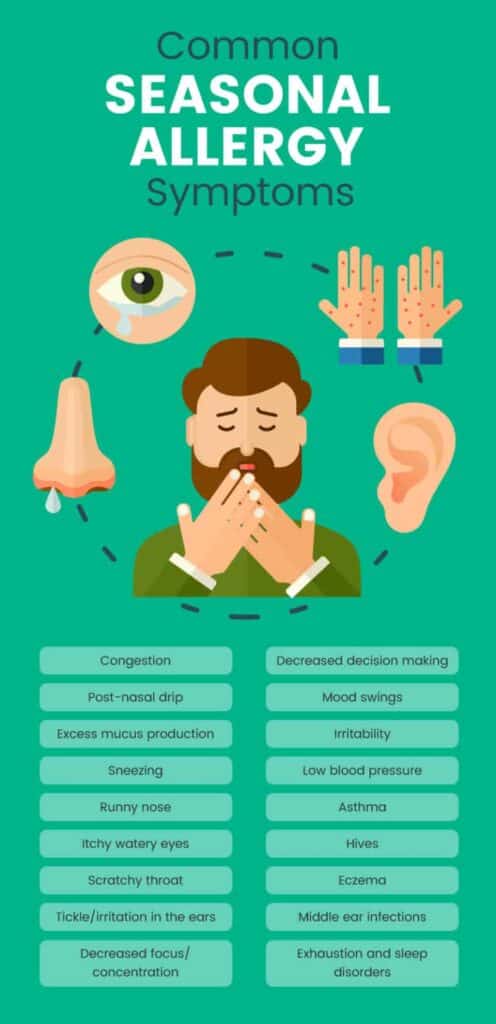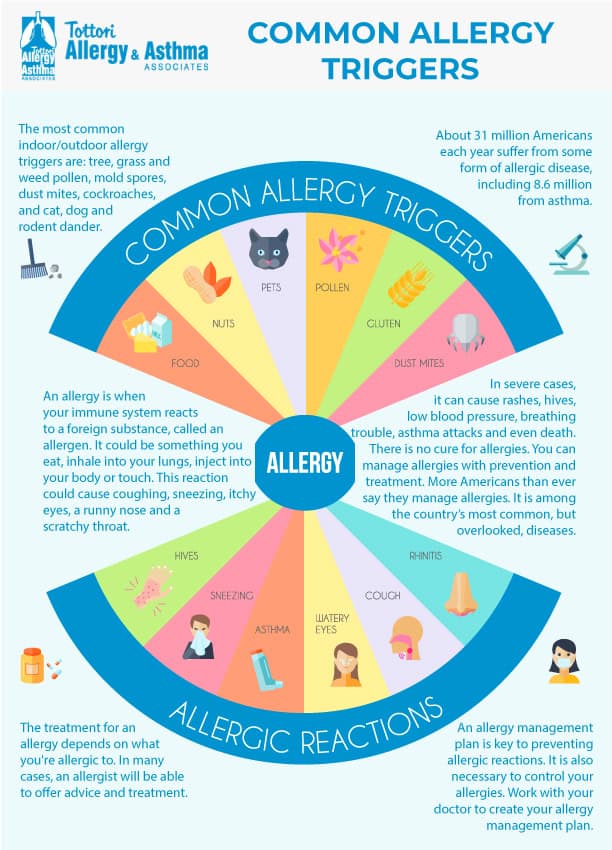Seasonal allergies, or allergic rhinitis, affect millions annually, particularly during spring and fall when pollen counts are high. Understanding the symptoms, triggers, and treatment options is essential for effective management.
🌼 What Are Seasonal Allergies?
Seasonal allergies occur when the immune system overreacts to airborne allergens like pollen from trees, grasses, and weeds. This immune response leads to inflammation in the nasal passages, eyes, and throat, causing various symptoms. (Allergic rhinitis)
🤧 Common Symptoms
- Sneezing
- Runny or stuffy nose
- Itchy or watery eyes
- Postnasal drip
- Itchy throat or ears
- Fatigue
- Coughing (Allergic rhinitis, What triggers seasonal allergies? – NIH MedlinePlus Magazine, What Are Seasonal Allergies?, Why Do My Allergies Get Worse at Night?, Allergen)

These symptoms can persist for weeks and may resemble a common cold but typically lack a fever.
🌿 Common Triggers
- Tree Pollen: Emitted in early spring by trees like oak, birch, and maple.
- Grass Pollen: Common in late spring and early summer; includes Bermuda and Timothy grasses.
- Weed Pollen: Prevalent in late summer and fall; ragweed is a significant contributor.
- Mold Spores: Can be present year-round but increase in damp conditions. (Allergen, What Are Seasonal Allergies?)

Climate change has extended pollen seasons, leading to prolonged exposure and intensified symptoms. (Can You Develop Allergies Later in Life? Understanding Adult-Onset Allergies)
🛡️ Treatment Options
1. Avoidance
- Monitor pollen forecasts and stay indoors during high pollen counts.
- Keep windows closed and use air purifiers with HEPA filters.
- Shower and change clothes after outdoor activities to remove pollen. (How to make your seasonal allergies a little less miserable)
2. Medications
- Antihistamines: Relieve sneezing, itching, and runny nose. Second-generation antihistamines like loratadine (Claritin) and cetirizine (Zyrtec) are less sedating.
- Nasal Corticosteroids: Reduce inflammation and are effective for nasal symptoms. Examples include fluticasone (Flonase) and mometasone (Nasonex).
- Decongestants: Alleviate nasal congestion but should be used short-term to avoid rebound congestion.
- Leukotriene Receptor Antagonists: Medications like montelukast (Singulair) can help, especially if asthma is also present. (Allergies: Types, Symptoms, Treatment & Management, Is It Safe to Take Allergy Medication Every Day?)
Consult a healthcare provider before starting any medication regimen.
3. Immunotherapy
For long-term relief, allergen immunotherapy (allergy shots or sublingual tablets) can be effective. This treatment involves regular exposure to small amounts of allergens to build tolerance. It’s particularly beneficial for individuals who don’t respond well to medications or wish to reduce long-term medication use. (Allergen)
🏡 Home Remedies and Lifestyle Changes
- Nasal Irrigation: Using saline sprays or neti pots can flush out allergens from nasal passages.
- HEPA Filters: Installing these in air conditioning systems can trap airborne allergens.
- Regular Cleaning: Dust and vacuum frequently to reduce indoor allergens. (Allergy Treatments)
While some people use local honey as a natural remedy, scientific evidence supporting its effectiveness for allergy relief is limited. (Does Honey Work for Relieving Allergy Symptoms?)
🧠 Final Thoughts
Managing seasonal allergies involves a combination of avoidance strategies, medications, and possibly immunotherapy. Staying informed about pollen levels and understanding your specific triggers can help you take proactive steps to minimize symptoms. Consult with a healthcare provider to develop a personalized treatment plan tailored to your needs. (Allergy Treatments)
Note: This blog post is intended for informational purposes only and does not substitute professional medical advice. Always consult with a healthcare provider for personalized recommendations.









